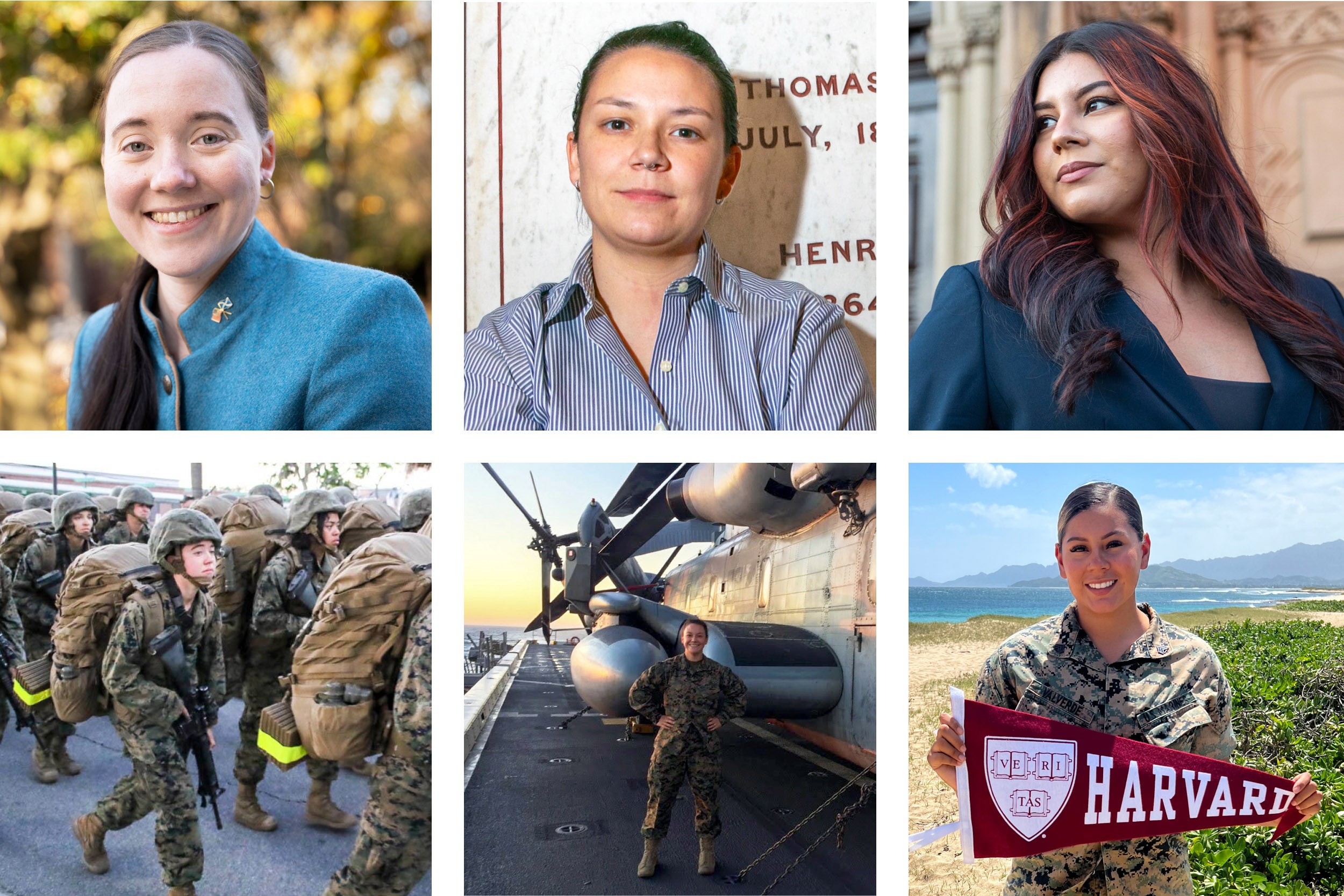
Alyssa Ross (from left), Naomi Whidden, and Vanessa Valverde on campus and during their military service.
Harvard staff photos by Niles Singer and Jon Chase; images courtesy of Alyssa Ross, Naomi Whidden, and Vanessa Valverde
A minority within a minority — women vets at College
They come from different backgrounds, but all agree on need to put themselves out there and hang in
Seventy-one U.S. military veterans attend Harvard College. That’s less than 1 percent of the student body. Of that group, only six are women. Ahead of Veterans Day on Nov. 11, the Gazette caught up with a couple of them about what it’s like to be at Harvard after hanging up the uniform.
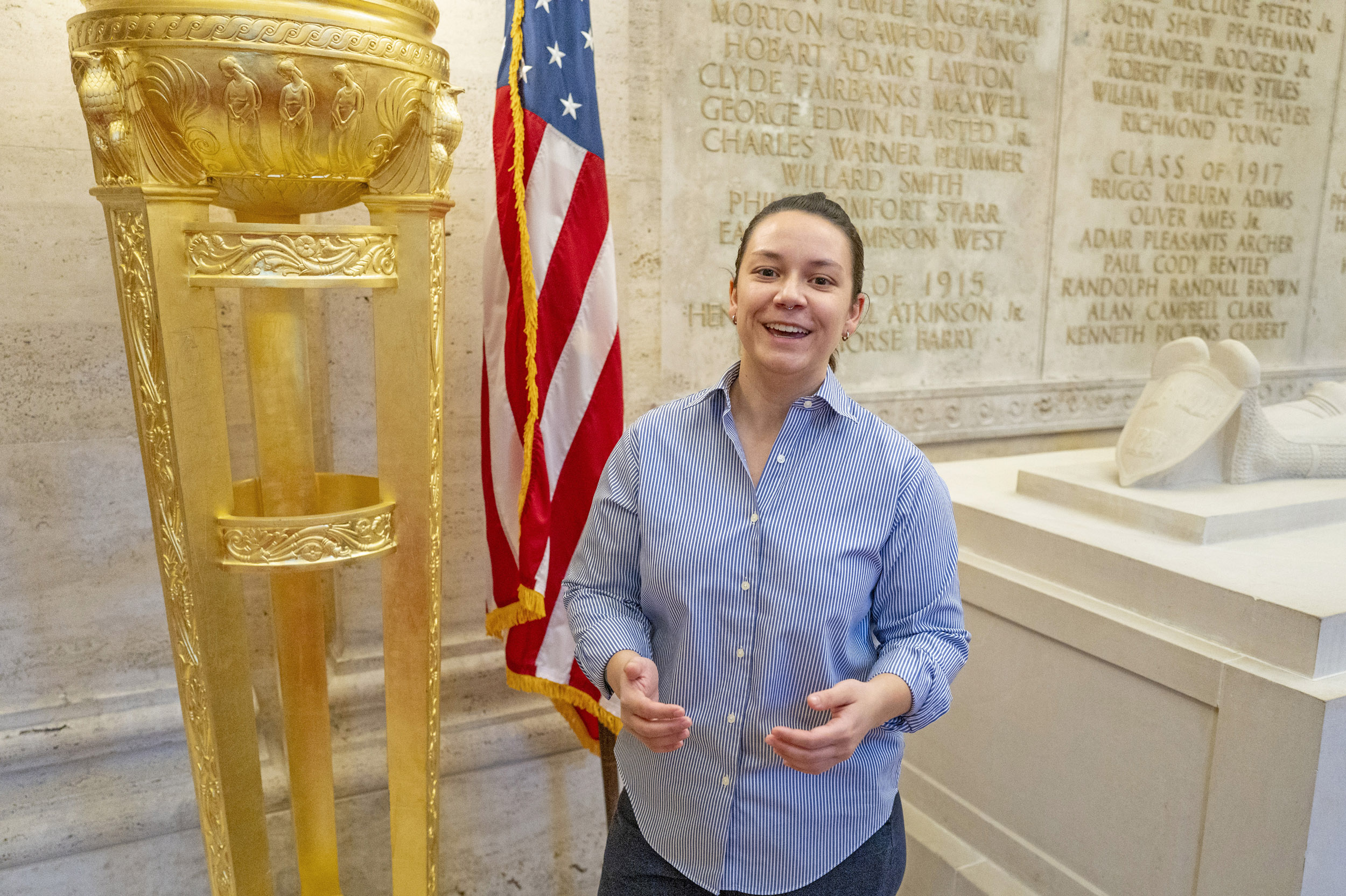
Jon Chase/Harvard Staff Photographer
Naomi Whidden
Marine Corps Veteran
Naomi Whidden went from fixing radios in the Marines to discovering stars in astronomy class.
Having joined up in 2017, former Sergeant Whidden served 5½ years as a ground electronics transmission systems maintainer, working with radios and communication systems that use radio frequency — things like satellite terminals or anything using satellite networks. The first-year, who attended the summer rising-scholars program, said she is looking to concentrate in plant sciences.
“I hope to work as a forester and maybe manage state timber or federal timber or something in the U.S. Forest Service,” she said. “To manage public resources in a way that’s responsible and sustainable.”
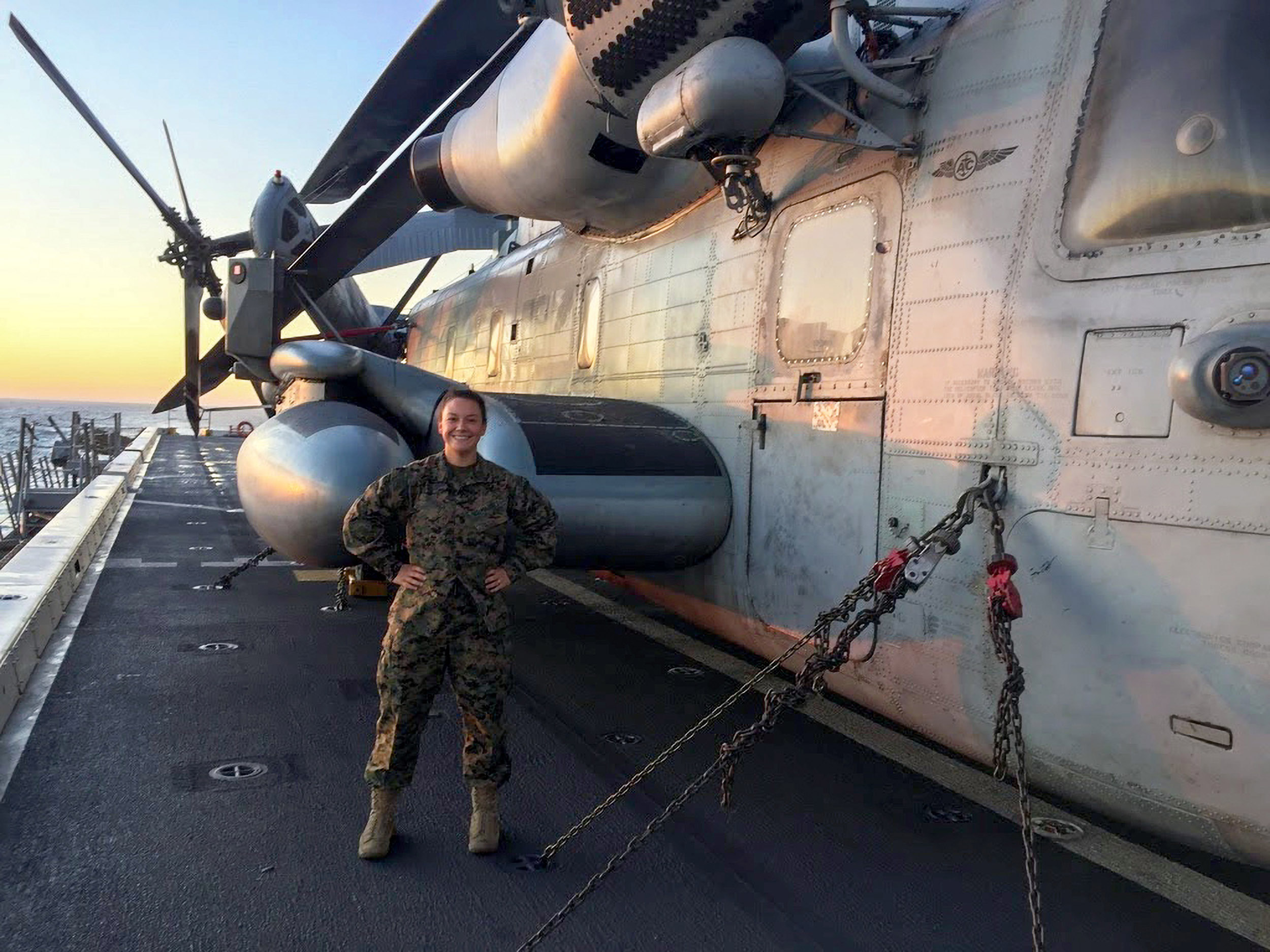
Courtesy of Naomi Whidden
One of the biggest challenges, she said, has been managing expectations, especially being in a long-distance relationship. She met her wife, Savannah, in the Marine Corps, and the couple got married in 2019. Savannah is still on active duty, living in Japan but soon to be stationed in D.C.
“A lot of times you justify being separated from your spouse by saying ‘I’m gonna go to school.’ And [expecting] to do well in school. And so sometimes when you don’t, you’re like, ‘Hey, is it worth it?’ For me to actually come here and be apart and then think you’re doing poorly? That can be really tough mentally.”
The key is remaining focused on the long-term vision. “I think that it’s important to keep yourself balanced and not get too upset about arbitrary grades,” she said.
Whidden, who enjoys cycling in her free time and has an affinity for tattoos, encourages classmates to get to know their veteran peers on campus.
“There is a cohesive veteran community here, but each each person is such an individual with such different backgrounds,” she said. “I think a lot of times there’s other students [who] think we’re just one type or we’re just one political view. Or we’re all from the same kind of cloth. And we all come from different backgrounds, different sexual identities, different family situations.
“Come say hi, and meet us and know that we’re all different and we’re a pretty diverse group.”
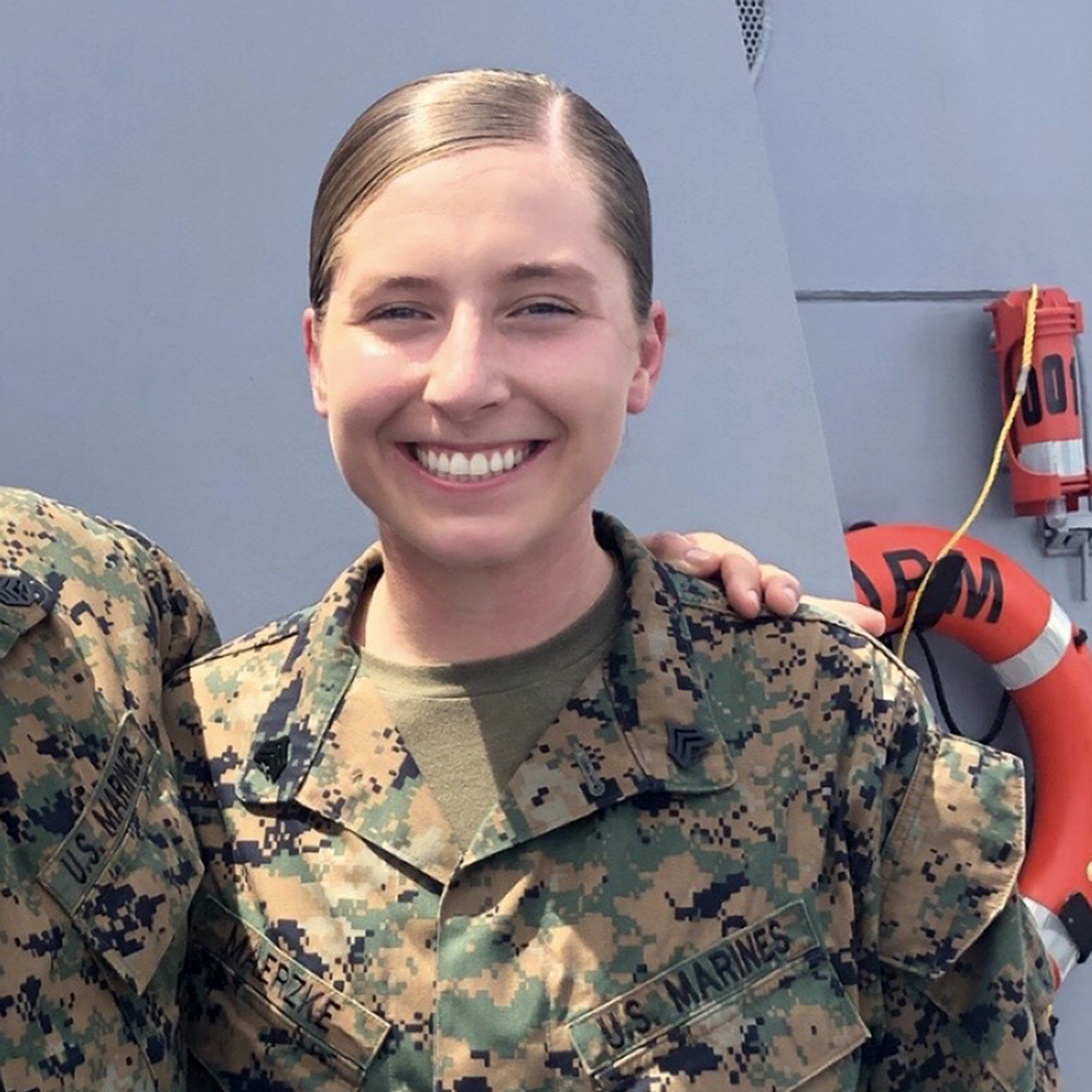
Photo courtesy of Alissa Maerzke
Alissa Maerzke
Marine Corps Veteran
Alissa Maerzke said she joined the Marines not only to serve her country, but “because it was the hardest branch, and I wanted the challenge.”
The 26-year-old grew up in the small town of Waterford, Wisconsin, 90 minutes from Chicago and 45 minutes from downtown Milwaukee. She graduated high school in 2014, then did a semester at community college after being turned down by the University of Wisconsin.
What was intended as a prank around high school graduation proved oddly prescient.
“The last day of high school, our valedictorian, she wanted people to wear a shirt with where they were going to college. And I was at this sports store, and I saw these Harvard shirts. I bought that and I wore it,” she said. “And she got really mad.”
Maerzke served as an intelligence specialist during her time in the Corps. Starting on a non-deployable unit, 1st Marine Division, Headquarters Battalion, she was eventually chosen to be one of the first people to integrate women into the 3rd Battalion, 5th Marines, an infantry group with a long history.
“When I showed up, I think I was the third female there, and the other two were an officer and a staff NCO,” she said.
After leaving the Marines in 2020, Maerzke spent three semesters, two of them online, at Columbia. Not the right fit, she set her sights on Harvard, and studying government.
“Working in intel, I guess I was very interested in international relations … And I love the classes. It’s awesome. Just being around all these incredibly intelligent faculty. And I’m very grateful for the opportunity,” she said. “And it’s also really awesome for me to see Harvard accepting more and more vets.”
When she’s not in class, Maerzke can often be found atop a horse during polo practice.
“I really love that,” she said.
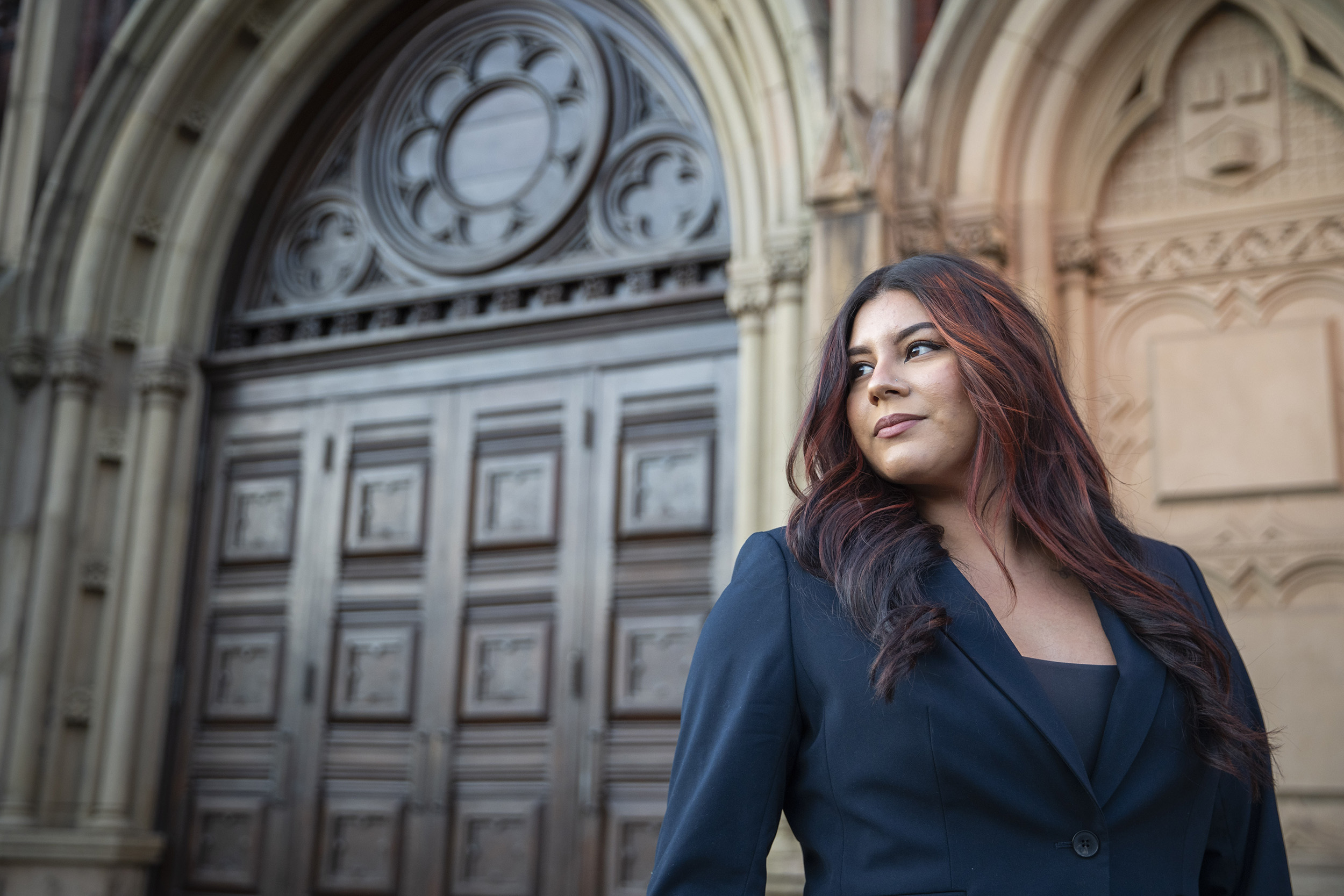
Niles Singer/Harvard Staff Photographer
Vanessa Valverde
Marine Corps Veteran
Originally from Los Angeles, Vanessa Valverde is one of “technically eight” siblings.
“I have four older stepsisters, a twin sister, younger brother, and a baby sister,” she said.
She and her twin, though, were the ones who got regaled with tales of glory by their Marine father when they were children.
“He talked about it all the time,” she said, smiling. “One time he asked me and my sister if we would do it when we were like 10 years old. And I was like, no way. No. Definitely not.”
Little did she know then that in the future she would have her own fond memories of the close friendships made with fellow Marines, and times she would look back on with pride.
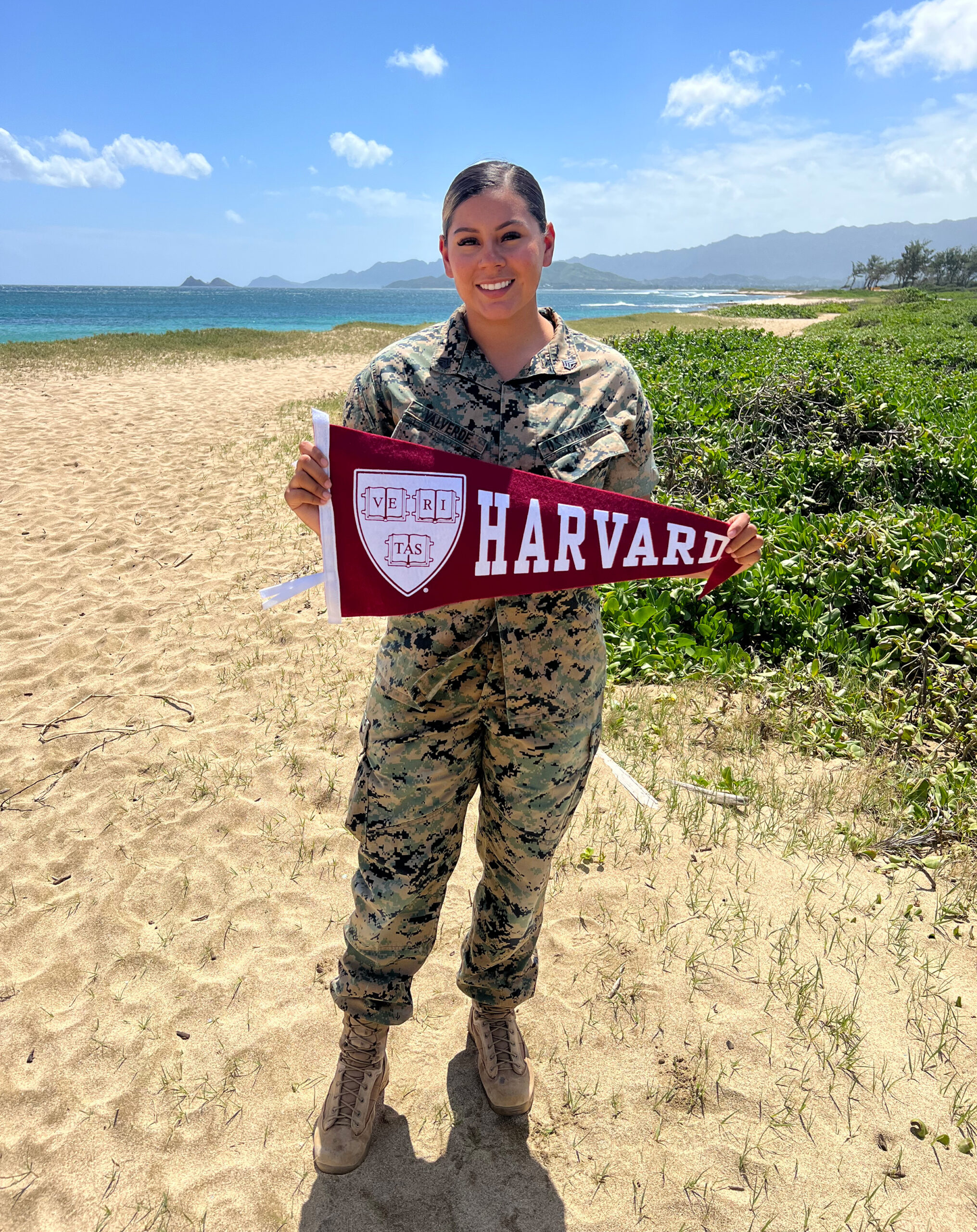
Courtesy of Vanessa Valverde
Valverde’s initial plan after high school was college. She attended classes for business at the University of California, Riverside, while her sister went off to boot camp. While away at college, unrest in Syria was making headlines, prompting Valverde to consider taking a break from higher education to get involved. It was attending her sister’s boot camp graduation that sold her.
“Within like a week, I swore in,” she said.
Valverde, who worked in signals intelligence during her time as a Marine, said the experience helped her prepare for her future in academia.
“When I went to college the first time I lacked passion and purpose, which my grades desperately reflected,” she said. “The Marines Corps gave me experiences that helped me have a passion for certain subjects in an academic setting.”
She added that her father also helped instill discipline early on.
“He would tell me, ‘Do it right the first time, so you don’t have to do it a second time.’ And that stayed with me. And they really preached that in the Marine Corps from day one,” she said. “When I’m taking notes I think to myself, ‘If this is the one opportunity I have to study this, I need to make sure I study it right.’”
Valverde said one of her proudest accomplishments as a female Marine was being a team leader. She said while she technically wasn’t a platoon sergeant, she fulfilled the duties of one.
“Female Marines just don’t get enough credit. Some of the most dependable people I’ve met and worked with, or even my friends, they’re the people who will get it done,” she said.
An undeclared first-year, Valverde was thrust into College life pretty immediately after finishing duty. She said she left her station in the Philippines in April or May, with School starting in August.
“You go from living right next to your best friends for six years — you do everything together — to all of a sudden you’re completely gone. And you’re watching your best friends move on without you,” she said. “Harvard Undergraduate Veterans Organization (HUVO) was great for meeting veterans. It’s great for finding like networking opportunities within the veteran community, or being able to find jobs that can recognize our experience.”
Of her female vets friend group, she says they watch movies together when they can.
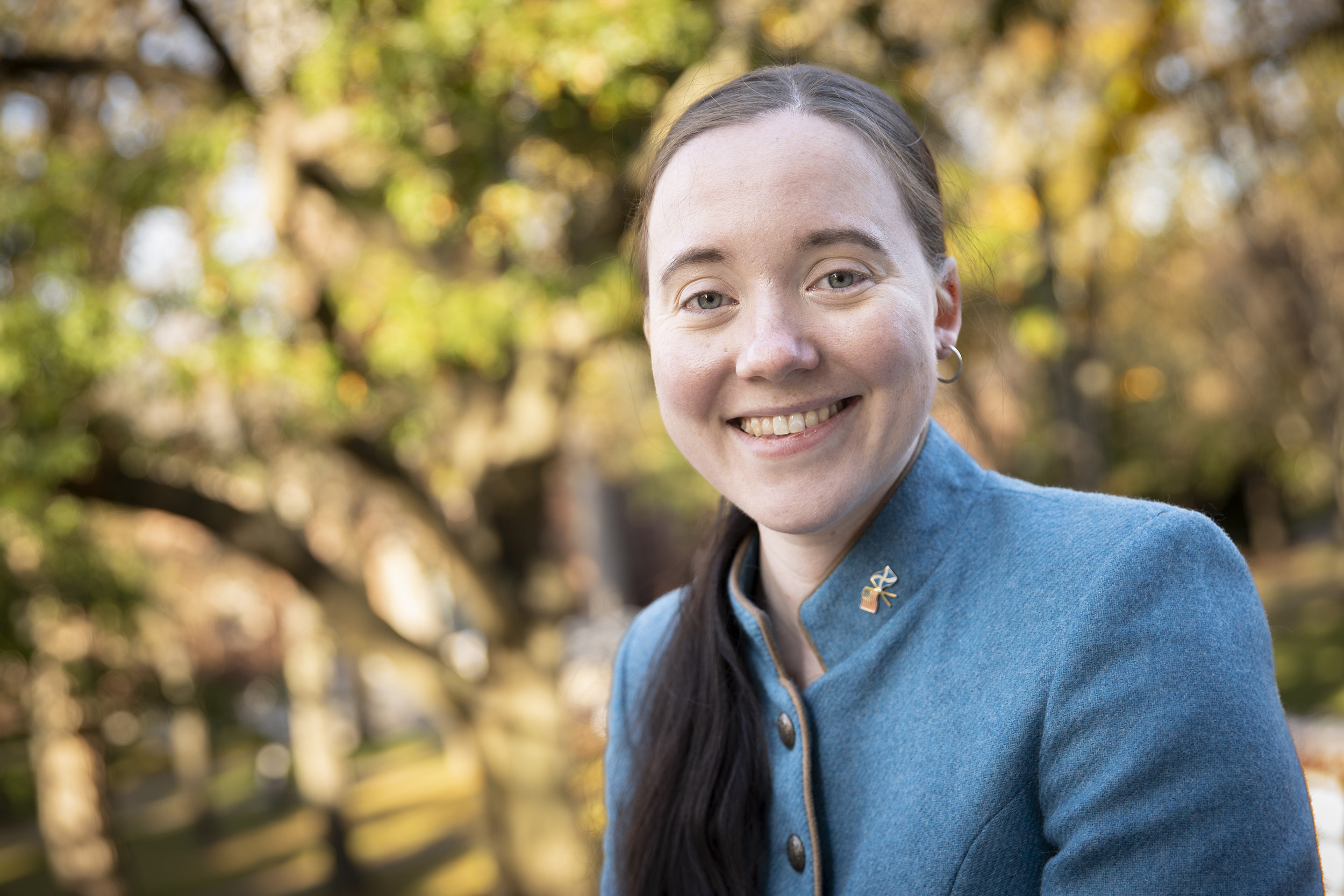
Niles Singer/Harvard Staff Photographer
Alyssa Ross
Marine Corps Veteran
Alyssa Ross, who grew up in the small town of Mexico, New York, didn’t know what she wanted to do after she graduated high school. She, alongside her twin sister, went off to SUNY Binghamton as an undeclared student.
She felt as if she found her calling watching a friend’s Marines graduation ceremony at Parris Island.
“I just was really motivated by what I saw there. But growing up, our parents had never wanted us to consider the military as a career path,” she said.
That’s not to say she wasn’t familiar with the Marines. Her high school had a JROTC program which she had always admired.
“I had a lot of admiration for the Marines that ran that program,” she said. “Becoming a Marine just seemed like an adventure and also like a challenge.”
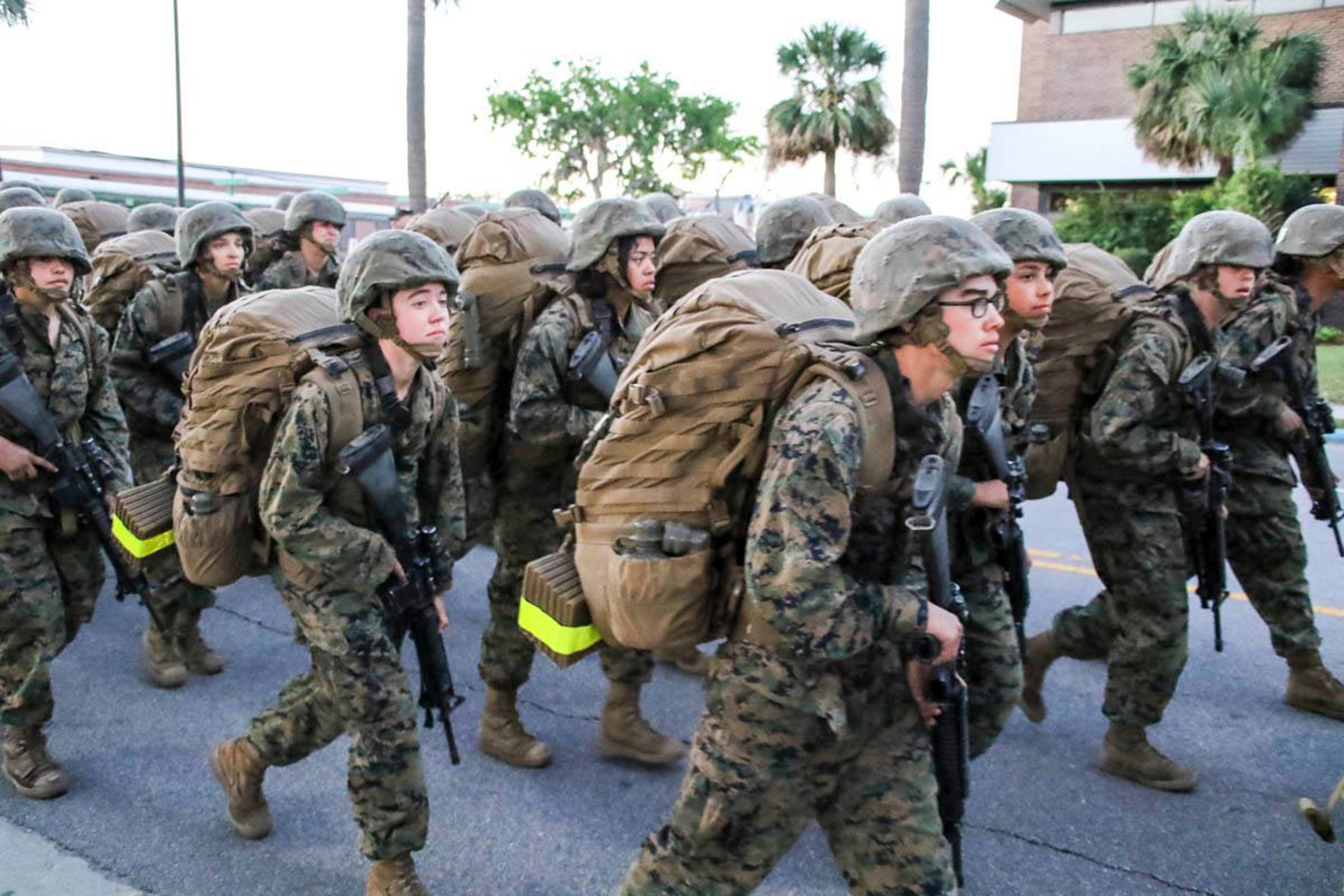
Photo courtesy of Alyssa Ross
Upon enlisting, Ross became a data systems administrator. She trained at a Marines schoolhouse in California before being stationed at the Pentagon in Washington, D.C., where she served with two different units. Altogether, Ross spent four years on active duty.
But when it became time to think about her next steps, Ross said it was a mentor — Major Monte — who encouraged her Ivy League path.
“He was always really supportive of me, and he knew that I wanted to go to college when I got out of the Marine Corps,” she said. “I hadn’t considered going to Harvard, but he encouraged me to apply to Ivy League schools. Now I’m here, and I have him to thank for that.”
Ross has surely made her mentor proud with only a semester and a half left before she graduates with a computer science degree. She said after graduation she wants to become a software engineer.
“I would say, as corny as it is, 100 percent of the people that go to Ivy League schools are people that applied to Ivy League schools. So the first step is applying,” she said. “I think people might be surprised by the things they can accomplish if they give it a shot. And veterans might not immediately think that they’d be welcome or wanted in the Ivy League community. But we are and we have things to offer here that are unique.”
However, not all was smooth sailing for the soon-to-be grad. Ross said it was hard to let go of the service when she first left.
“I realized how much the Marine Corps had become part of my identity in that time, and then suddenly not being around Marines anymore, and not having the close-knit unit that you had, takes some adjusting to,” she said. “There’s times I miss the Marine Corps a lot. There’s other times, though, where I feel a great sense of freedom. You give up a lot of freedoms when you’re serving — freedoms you probably didn’t realize you even had. Getting them back after you get out is a special feeling. It makes me feel compelled to take advantage of them.”
Ross has rebuilt some of that community with her role as director of membership engagement at HUVO, and by spending time with her fellow female vets. She said their group chat is called Femmes Fatales.
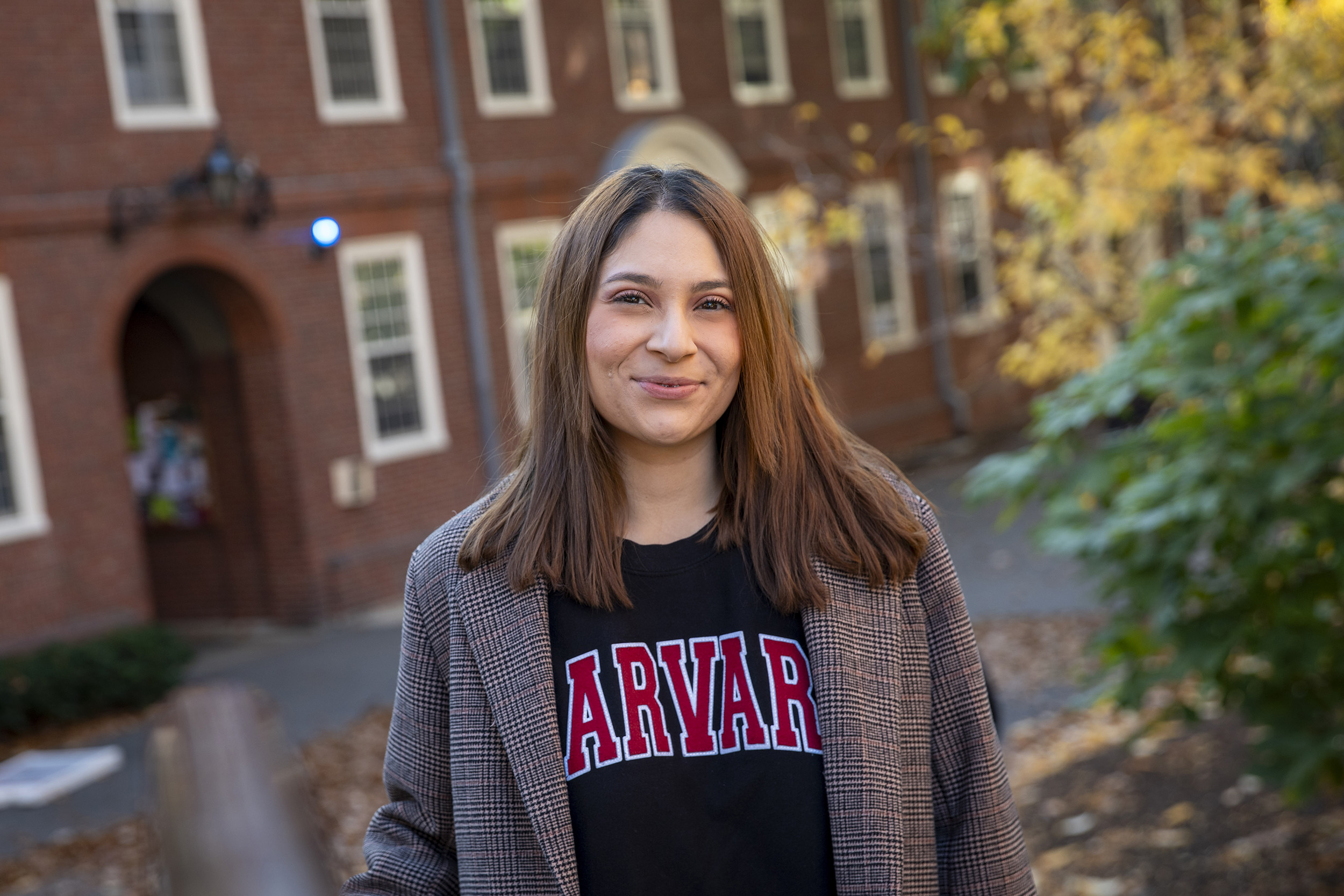
Niles Singer/Harvard Staff Photographer
Ayleen Villarreal
Air Force Veteran
First-generation college student Ayleen Villarreal’s parents, originally from Mexico, immigrated to El Paso, Texas, before she was born. Villarreal lived there until she enlisted in the Air Force at 19. The native Texan served 4½ years.
“I joined the Air Force because I wanted to be independent,” she said, proudly repping her Harvard sweatshirt on a sunny day on the yard. “But I knew it was going to be temporary because I knew I was going to get my degree.”
Villarreal kept her sights trained on college. While serving as an intelligence analyst, she took college classes online, adding to dual-credit classes she took in high school. Despite coming from a background unfamiliar with higher education, Villarreal said she set her sights high.
“I always wanted to go to Harvard. Harvard has been my dream school since I was a kid. And so I decided to apply because I wanted to see if I got rejected. I wanted to try, because the answers are always going to be no unless you ask,” she said.
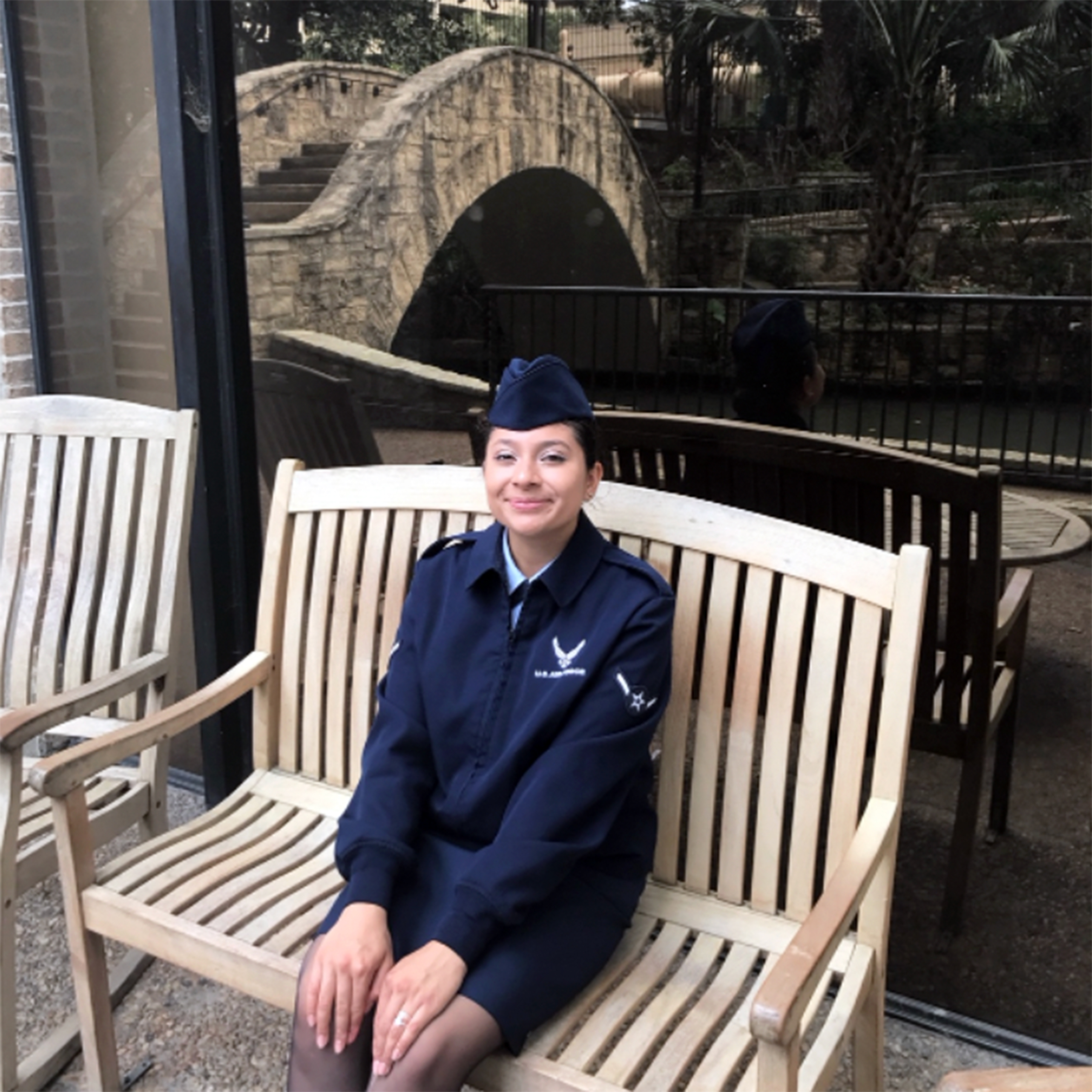
Photo courtesy of Ayleen Villarreal
Once she got accepted, Villarreal said she didn’t know what to expect. Coming from the military, and from a low-income immigrant family, Harvard seemed daunting.
“People that have no knowledge about college don’t know what to expect,” she said. “I assumed it was going to be hard in some way, but that’s what it’s supposed to be.”
Currently a junior studying government, with a secondary in global health policy, Villarreal said she has gotten the hang of academics versus the high-pressure daily tasks she did while active.
“As a junior, I can identify better ways to manage all the work, but definitely coming in as a student veteran, that definitely was a different scenario from being in the U.S. Air Force. Honestly, the only thing that is similar to the military is that you’ll have to be persistent. And you have to dedicate time to it.”
She added, “The biggest challenge for me was when I first came in was shifting my mindset from U.S. Air Force needs first to my needs first. And focusing instead of saving lives and protecting national security of the U.S. into writing essays and doing homework and showing up to my classes.”
Villarreal hopes to go to law school when she graduates.




